

Meningsbyggnad. Det viktigaste för en text är innehållsligt sammanhang.
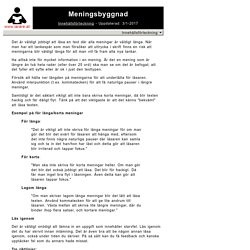
Om innehållet inte hänger ihop blir det ingen text. Uppgift 1: Jämför texterna och fundera på vilken av dem som är tydligare. Markera ställen i texterna som gör att den röda tråden är tydlig eller otydlig. Text 1 Vill man ha roligt i Norden ska man åka till Köpenhamn. Text 2 Kommunalnämnden har utsett Bo Ehnberg till ny granskare av Kommunhems nyligen avslöjade rekordunderskott. Reflektion Förmodligen kunde du utan besvär förstå text 1, medan text 2 verkar förvirrande. Writing a compare contrast essay - English Writing. This page has dictionary look up.
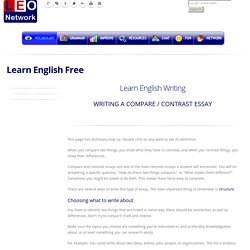
Double click on any word to see its definition. When you compare two things, you show what they have in common, and when you contrast things, you show their differences. Compare and contrast essays are one of the most common essays a student will encounter. You will be answering a specific question, "How do these two things compare,", or "What makes them different? " Sometimes you might be asked to do both. There are several ways to write this type of essay. Choosing what to write about You have to identify two things that are linked in some way, there should be similarities as well as differences. Make sure the topics you choose are something you're interested in, and preferably knowledgeable about, or at least something you can research easily. For example: You could write about two ideas, events, jobs, people, or organisations.
How to start Once you've decided on two things, try writing a list of what they have in common and what is different about them. The Passive. An active sentence like I drank two cups of coffee has the subject first (the person or thing that does the verb), followed by the verb, and finally the object (the person or thing that the action happens to).
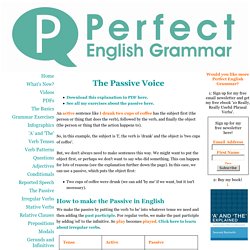
So, in this example, the subject is 'I', the verb is 'drank' and the object is 'two cups of coffee'. But, we don't always need to make sentences this way. We might want to put the object first, or perhaps we don't want to say who did something. This can happen for lots of reasons (see the explanation further down the page).
In this case, we can use a passive, which puts the object first: Two cups of coffee were drunk (we can add 'by me' if we want, but it isn't necessary). Learn English - Passive Voice. Exercises on Passive Use of Passive Passive voice is used when the focus is on the action.
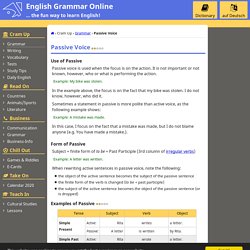
It is not important or not known, however, who or what is performing the action. Example: My bike was stolen. In the example above, the focus is on the fact that my bike was stolen. Sometimes a statement in passive is more polite than active voice, as the following example shows: Example: A mistake was made. In this case, I focus on the fact that a mistake was made, but I do not blame anyone (e.g. Form of Passive Subject + finite form of to be + Past Participle (3rd column of irregular verbs) Example: A letter was written. When rewriting active sentences in passive voice, note the following: 147391. The Punctuation Guide.
This is where things get tricky.
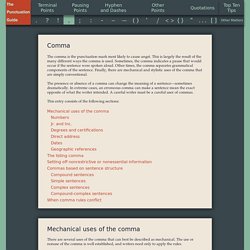
Mastering the proper use of the comma in these situations is impossible without at least some understanding of grammar. The rules are easiest to learn and deploy if you first understand four common sentence types: compound, simple, complex, and compound-complex. Compound sentences A compound sentence contains two or more independent clauses linked by a coordinating conjunction. Independent clauses are those that can stand alone as complete sentences. Rule: Use a comma before a coordinating conjunction that joins two independent clauses. She purchased the car, but she declined the extended warranty.
The prime minister’s plan seemed quickly and sloppily put together, and the opposition party immediately attacked it. Are you traveling in first class, or does your employer limit you to business class on international flights? I lost my job, so I can’t afford to go to Europe this summer. A+ Papers. 3 Tips to Improve Writing in English. The most important rule to writing effectively is to not repeat yourself.
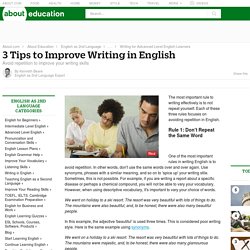
Each of these three rules focuses on avoiding repetition in English. Rule 1: Don't Repeat the Same Word One of the most important rules in writing English is to avoid repetition. In other words, don't use the same words over and over again. Use synonyms, phrases with a similar meaning, and so on to 'spice up' your writing stile. We went on holiday to a ski resort. In this example, the adjective 'beautiful' is used three times. We went on a holiday to a ski resort. Rule 2: Don't Repeat the Same Sentence Style In a similar way, using the same sentence structure by repeating the same structure over and over again is also considered bad style.
The students studied hard as the test was sure to be difficult. In the four sentences above, I've used four different variations on 'because'. Coordinating Conjunctions - also known as FANBOYS. Examples.